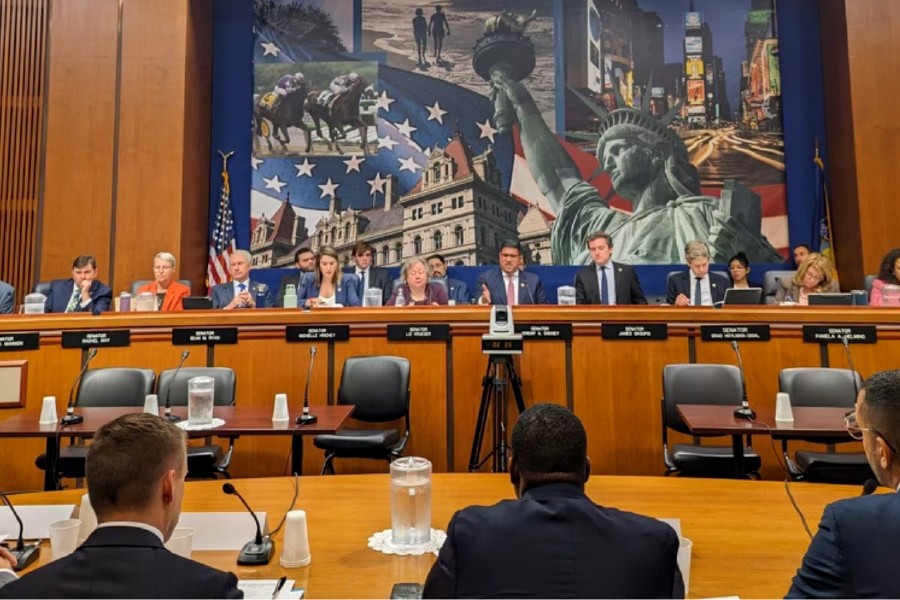
Today, the New York State Office of Cannabis Management (OCM) published the second in a monthly series of enforcement action updates against unlicensed cannabis shops across the State.
These updates will be released on the first Monday of each month through the end of the year.
Inspections & Seizures: During the month of November, investigators from OCM and the Department of Taxation and Finance (DTF) inspected 71 shops, including 13 re-inspections, suspected of selling unlicensed cannabis. These inspections resulted in the seizure of 812 pounds of flower, 701 pounds of edibles, and 61 pounds of concentrate, with an estimated value of $7,284,986. These actions bring the total of inspections to 350 locations, 88 of which have been re-inspected, to yield over 11,000 pounds of seized illicit cannabis worth more than $54 million. OCM and DTF investigators will continue inspections each and every week across the State.
Court Victories: On November 21, OCM, in collaboration with the Office of the Attorney General (OAG), won its first petition for emergency relief under Section 16-a of the Cannabis Law, a new section of the law that just went into effect this year. This victory established an important precedent allowing the State to seek longer term closures for businesses found to be illegally selling cannabis. In this case, the Court issued a permanent injunction and one-year permanent closing order against illegal operator David Tulley of “I’m Stuck” in Wayne County. The Court agreed with OCM and the OAG that Tulley had engaged in unlicensed sale of cannabis and rejected Tulley’s argument that the “cannabis consulting business model” did not require a license. The Court’s Order continued the padlocking that had been granted by the Court on an emergency basis earlier this year. An assessment of total penalties will be finalized in the coming weeks.
On November 29th, OCM, in collaboration with the OAG, also successfully secured a temporary restraining order and temporary/closing/padlocking order against the unlicensed operator George West of Jaydega 7.0 in Canandaigua. A hearing on the request for a permanent injunction and closure of Jaydega 7.0 is scheduled for next month in Ontario County Supreme Court.
Training for Municipalities: With a continued focus on collaboration and coordination with the goal of maximizing enforcement partnerships, OCM and the OAG will host a public webinar for municipalities across the state on Thursday, December 7 to provide vital education and resources around best practices and opportunities to shut down illicit operators.
“As we look ahead to this next chapter in New York’s cannabis market, we continue to prioritize safety across the state by working diligently to shut down illegal operators,” said Chris Alexander, Executive Director of The New York State Office of Cannabis Management. “The number one remedy for the problem of these illicit shops is getting more legal businesses open. New Yorkers want to know where their products are coming from, and they know they can rely on safe, trusted, and locally grown cannabis when they walk into one of our legal dispensaries. We will continue to seize illegal products, and we know that the collaborative work continues across all levels of government to address this public health crisis.”
Fines for the illegal sale of cannabis start at $10,000 per day and can rise up to $20,000 per day for the most egregious conduct. An additional fine of $5,000 can be levied for removal of the Order, and the inspected businesses may also be subject to additional violations and penalties under the Tax Law. Additional fines may be assessed. The enforcement legislation passed in May 2023 also authorizes OCM to seek a State court order to ultimately padlock businesses found to be in repeated violation of the law. In addition, the law makes it a crime to sell cannabis and cannabis products without a license.
To bring many levels of government together to combat the illicit sale of cannabis, Governor Hochul announced partnerships between OCM and the OAG through which municipalities across the state can receive training on how to utilize a particular provision — Section16-A — of the new enforcement law signed by Governor Hochul in May 2023 to pursue padlocking orders in State Court. 16-A authorizes local governments, including county attorneys, with OCM’s approval, to pursue padlocking orders from a court against an unlicensed cannabis business found to be engaged in egregious conduct. This authority significantly augments the ability for different levels of government to work together to shut down illegal cannabis operators.
In addition to these new partnerships with localities, the Governor announced that additional State agencies will now be bringing the weight of their business enforcement powers to bear as part of the State’s creative and aggressive approach to combating the illicit market. The Department of Labor and the Workers Compensation Board are joining these efforts to ensure businesses selling cannabis without a license are compliant with New York State labor and workers compensation laws.
This approach, which combines the enforcement powers of labor law, tax law, and cannabis law, can result in non-compliant business owners potentially facing tens of thousands of dollars in penalties as the result of a single inspection and violations, significantly enhances the State’s ability to crack down on those who engage in illicit sales, and reaffirms the Governor’s deep commitment to ensuring that the law is being followed and that New Yorkers are protected from potentially unsafe products.
New York State currently has 27 licensed adult-use cannabis dispensaries and has approved 44 Cannabis Growers Showcases. All regulated, licensed dispensaries must post the Dispensary Verification Tool sticker near their main entrance. Any store selling cannabis that does not display this sticker is operating without a license.
Become a Harlem Insider!
By submitting this form, you are consenting to receive marketing emails from: . You can revoke your consent to receive emails at any time by using the SafeUnsubscribe® link, found at the bottom of every email. Emails are serviced by Constant Contact








